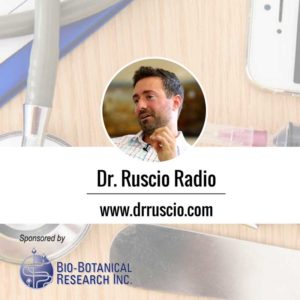Listener Questions: Arthritis, Trustworthy Supplement Brands, HCl Causing SIBO, Thyroid Antibodies, Adrenal Fatigue and Phage Therapy
Let’s cover some listener questions, including:
- Arthritis
- Trustworthy Supplement Brands
- HCl Causing SIBO
- Thyroid Antibodies
- Adrenal Fatigue
- and Phage Therapy
Dr. R’s Fast Facts
Can you provide some insight on the condition Ankylosing Spondylitis (AS)? (Cody)
- Ankylosing Spondylitis is inflammatory arthritis of the spine
- Grouped into a larger class of Spondyloarthritis
- Association to klebsiella pneumonia – in this study
- Non-Celiac Gluten Sensitivity might drive Spondyloarthritis
- In the study all subjects were negative for celiac
- All improved from a Gluten Free diet
- All (3 of 4) who reintroduced gluten experienced a symptomatic relapse. The fourth person never attempted a reintro
- Contact Heidi Turner who was on the podcast recently, she works with many proficient RA colleagues
- Consider low sulfur diet
- Try the dietary protocol for dysbiosis in the book Healthy Gut Healthy You
- Consider the Elemental Diet
What are the most trustworthy supplement companies/brands? (Laura S.)
- Here’s a link to our store which has many of the products and brands I trust
- There are many good companies out there: Designs For Health, Moss, Klaire Labs, Biocidin, Biotics, Vitamin Nutrienet, Integrative Therapeutics, Equip and Perfect Keto, Pure Encapsulations, Nordic Naturals
- If you need to take the more expensive line of products to avoid fillers and excipients, I recommend taking the minimum dose and duration until you are back to feeling better.
Does HCl directly feed methane? (Pam and GJ)
- If you are known to be deficient – use HCl. Experiment and only use it if you notice clear benefit
- Also, avoid acid lowering unless it’s medically necessary
- Over utilization of HCl is a problem in natural medicine – I detail this in my book
- If you are over 65, have an Autoimmune Disease or have a history of Anemia you have increased risk of inadequate stomach acid
- There is a big difference between commenting that HCl could feed methane and that HCl supplementation causes methane SIBO
- Review of literature shows NOTHING to substantiate this other than mechanistic speculation
SIBO, Meat, Constipation with RA (Courtney)
- Lower fiber can improve bloating but may lead to constipation in some people
- Focusing on minimally fermentable fiber foods may help this
- Adding in Magnesium or vitamin C can help too
- Enbrel might help but here’s a study that showed it did not benefit IBD
- Consider: elimination diet (paleo low FODMAP), elemental diet, herbal antimicrobials
- I’ve seen one remarkable case here
What are Healthy Levels of Thyroid Antibodies?
- 0.5-2.5 for TSH is a treatment goal not a diagnostic range. Most Subclinical Hypothyroid (SCH) don’t benefit from treatment until TSH is >10 (SCH is when you have high TSH and normal T4)
- Paper referring to TPO Antibody levels
- There are many reasons why these markers should NOT be treated as a diagnostic range like
- The older someone becomes the more normal a higher TSH becomes
- There is a fluctuation in TSH that occurs from day to day
- This DOES NOT mean that someone, not on medication with a TSH above 2.5, is hypothyroid or require treatment or even need to be alarmed
TPO Antibodies
- Intervene and then re-evaluate
- If people are healthy who are in the low hundreds = you’re done
- If people are healthy who are > low hundreds = take reasonable steps
- People who are unhealthy with any level of Thyroid antibody – continue to optimize their health
- Study regarding the lower quality of life finding
Adrenal Fatigue & Recurring Yeast Infection (Nancy)
- Adrenal fatigue is a fairly unreliable diagnosis
- Fatigue is a symptom not a root cause
- Gut dysbiosis might connect to yeast infection this is why we see probiotics improve yeast infection and UTI
- Female hormone imbalance may also be an issue
- High allostatic load (stress) can lead to dysbiosis
Phage Therapy
- Phages are viruses that can inhabit bacteria and effect their function and may have some antibiofilm and antimicrobial effect.
- Some studies have shown they are effective but these are different than the “off the shelf” phages that are showing up in the United States
- Be very cautious, if it’s a phage probiotic, there is no evidence that supports that these work
- If there is a company that will create a custom preparation for you, that might be worth trying
- Get help using this information to become healthier.
- Get your personalized plan for optimizing your gut health with my new book.
- Healthcare providers looking to sharpen their clinical skills, check out the Future of Functional Medicine Review Clinical Newsletter.
Ankylosing Spondylitis … 00:01:00
Supplement Companies/Brands … 00:11:24
Does HCl Directly Feed Methane … 00:16:37
SIBO, Meat, Constipation with RA … 00:22:30
Healthy Levels of Thyroid Antibodies … 00:26:40
Adrenal Fatigue & Yeast Infection … 00:38:30
Phage Therapy … 00:47:13
Episode Wrap-up … 00:52:09
Download Episode (Right click on link and ‘Save As’)
- The association of HLA-B27 and Klebsiella pneumoniae in ankylosing spondylitis: A systematic review.
- Elemental Heal
(click green Links bar above to expand and see all links/references) - Dr. Ruscio’s, DC, Store
- Co-Managing IBD & Arthritis: A Complex Prescription
- The Gut Autoimmune Connection: SIBO and RA
- Anti-Thyroperoxidase Antibody Levels >500 IU/ml Indicate a Moderately Increased Risk for Developing Hypothyroidism in Autoimmune Thyroiditis.
- Autoimmunity affects health-related quality of life in patients with Hashimoto’s thyroiditis
- Biocidin
- Healthy Gut Healthy You
- drruscio.com/resources
Episode Intro
Dr. Michael Ruscio: Hey, everyone. Welcome to Dr. Ruscio Radio. This is Dr. Ruscio, DC. Today, let’s jump into some listener questions, and let me lead by saying I’m currently feeling a little slow. I’m on the cold turkey train out of caffeine town. I felt like I was consuming caffeine too often. I started having the feeling that if I didn’t have caffeine my brain started feeling slow.
Not that I had felt like I’d like to feel faster from the caffeine, but without it, I felt like I was slower than normal which told me I was getting to a point where it was too much. So now I am a few days into a cold turkey off-of-caffeine. And I’m feeling a little slow, so I have to admit I am working for you today because I do not want to be doing this. I’d rather be doing something more mindless rather than researching some of these questions and kind of putting my brain into high gear here.
Ankylosing Spondylitis
But you guys mean a lot to me, so I will soldier on and we wi
“Hi, Dr. Ruscio. My name is Cody, and I have a few questions regarding an autoimmune disease rarely talked about: ankylosing spondylitis. I was diagnosed a few years ago by my rheumatologist, and I do test positive for the HLAB-27 gene marker, which I’m told is a known carrier for the autoimmune disease. I do really well on Humira, but this seems to be kind of the only treatment.
When doing my own research. I really cannot find much about treatments for this disease, and I’m hoping functional medicine can provide some answers. I might not be looking in the right spot, but I can’t really educate myself because there really doesn’t seem to be much research posted.
So my questions mainly surround the premise of what insights can you provide with regard to AS? Have you had any patients with AS? Are there any success stories that you can share with functional medicine treatments? Are there any tests that you might suggest that I should be doing or have done? What really seems to work best for people with AS?
And I don’t know what flares up my AS because I really don’t have any known food allergies or digestion issues. So I understand that there’s a number of things that can flare up any autoimmune disease, but I would just like to know your thoughts. And what might be a good place to what to get down to the bottom of this? Or am I kind of at the mercy of my genes and AS tends to be more of a management autoimmune disease? So any insights that you can provide, I would appreciate it. Thank you.”
Great question, Cody. This is an older question, so I apologize for it taking so long to get back to you. A few things. One, you’re right. There’s not nearly as much discussion about AS. I guess for the audience let me define. AS is an inflammatory arthritis of the spine and is grouped into a larger class of spondyloarthritides which mainly affect the spine and typically affects the forward section of the spine, the anterior aspect of the spine.
If you’ve ever seen someone who had very slumped forward posture, like very, very—not someone who just has bad posture but someone who had unusually forward slumping of their shoulders or the appearance of that—that could be progressed AS, so it is serious. And Cody, I hope we can steer you in the right direction to help prevent progression of the AS.
It’s an association between Klebsiella pneumoniae and AS. I can’t say I’ve seen much published in the way of treatment that seems to be highly accessible. I will link for you to a study that discusses this association, and in addition to this it discusses some potential dietary changes. This study I have not read, but it’s something to dig into. I have had a few patients with AS. And some, we’ve found Klebsiella pneumoniae on stool testing, and we’ve treated it. But haven’t followed up very closely.
And really, I think to get a good follow up on that, you probably want to be working with a rheumatologist who may be tracking certain inflammatory markers, if there are any that are known to correlate with disease activity as well as performing any imaging studies. And for the patients that I worked with, I don’t believe they were symptomatic enough to prompt them to want to go through that level of rigor of analysis and only having seen a handful of cases, I really don’t have much firsthand experience to be able to offer you to draw from, but I do have some other thoughts.
Non-celiac gluten sensitivity does have an association to spondyloarthritis, so that would include AS. And I’ll link to one study done. It was a rheumatology clinic that essentially found four patients with spondyloarthritis who were all negative for celiac, all improved from a gluten-free diet. And three of the four noticed a flaring of symptoms with the reintroduction of gluten, and the fourth never attempted a reintroduction. So that is something to consider.
Now, you may not notice a reaction to gluten until you get older. There was a fairly well-performed study done recently that showed that 30s and 40s are when most people will notice non-celiac gluten sensitivity. So there may be a degree of this regarding age of onset where you may not notice any symptomatic flaring from gluten until you get older. There’s a tough dialogue here. There’s a balance.
It seems most practical, like this study found, that if you were to have a dietary fueling of AS, that you’d notice symptoms upon ingestion of that food trigger, in this case gluten. However, there is the argument of fueling an inflammatory process that may not manifest for years. And with a condition like AS that you’re looking at a strong immunosuppressive drug or essentially deformation of a joint as your options, you may want to play this on the safer side and generally avoid gluten. Maybe an occasional consumption of gluten, but you may want to generally avoid gluten here, even if you don’t have any discernible symptoms.
That would be a more aggressive treatment option. I don’t know even if that would be effective. There may be data published in the future that refutes that. However, that is something to think about that association has been drawn, and even if you don’t have any discernible reaction to gluten now, you may in the future. And that may fuel your AS. But I would proceed with that as practically as you can and weigh the pros and the cons there.
You may also want to contact Heidi Turner who is a nutritionist, very sharp nutritionist, who was on the podcast a number of months ago. She works alongside rheumatologists and could probably give you some good counsel from a dietary perspective. And there’s also the consideration of a low sulfur diet which may also be helpful. And you can try the protocol in Healthy Gut, Healthy You for dysbiosis. That certainly is something I would consider. And you may also want to experiment with the use of an elemental diet.
The use of diet therapy, treatment of dysbiosis, elemental diet use occasionally may be enough to prevent the need for a medication. But I wouldn’t take that lightly because if the only you know, if natural interventions were not enough, is by losing the structural integrity of your spinal vertebrae, I don’t know if that’s a risk I’d be willing to take. I don’t know if I am philosophically inclined to natural medicine enough to take that risk. And I don’t know if that’s a smart risk to take.
With that condition, I would err on the side of being more aggressive with your treatment to prevent any progression and try to find a clinician who can work with you in finding some preventative markers to let you know if natural therapies are holding you at your current level or if they’re not holding you there and you need to add in and use an integrative approach with both natural and conventional medicine. So hopefully that helps.
Sponsored Resources

And how I came to learn about Biocidin was actually after a few patients of mine—who had been reacting to all other forms of anti-microbials—went out, did some experimentation, and actually found the only anti-microbial formula that they did not negatively react to was Biocidin. So this got me to open my eyes and give them a further look.
And they have a few products I think are worth mentioning. One is their anti-microbial Biocidin, which comes in a few different forms. They also have Proflora®4R, which is one of the few soil-based probiotics that I recommend. And also they have Dentalcidin, which is their Biocidin in the toothpaste form. And this may actually help with the removal of oral biofilms.
Now, if you go to Biocidin.com and you use the code RUSCIO, they will give you free shipping and a free bottle of Dentalcidin when you purchase their comprehensive cleansing program. They do have wholesale pricing available for licensed healthcare practitioners if you email [email protected]
So Biocidin definitely has some helpful products for improving your gut health. And I would definitely recommend checking out Biocidin for more information on a few of these tools that can help you in optimizing your gut health.
Supplement Companies/Brands

“Does Dr. Ruscio have a podcast addressing the most trustworthy supplement companies/brands? If not, I think a blog post or a quick podcast evaluating supplement companies would be a huge benefit to listeners. With so many low-quality supplement companies out there, I want to make sure that I’m getting quality products and want more substantial input than Amazon reviews.” Good point. “I want to maximize quality for price but can sustainably afford the supplements offered through my local functional practitioner. I’m currently looking at brands like Nordic Naturals, Pure Encapsulations, Zenwise, and Bulk Supplements. Thank you.”
Ok. So I’ve put together a line in our store, and I’ll link to our store there. So there’s a number of products there. There are also a number of companies that I like: Designs for Health, Moss, Klaire Labs, Biocidin, Biotics, Vital Nutrients, Integrative Therapeutics, Equip, Perfect Keto, Pure Encapsulations. I also like Nordic Naturals. So I think that gives you a start. It is a tough question to balance cost and quality. And it may depend on who you are as a person.
I’ve been toying with the idea of rolling out an economy line so that we have two different levels of lines. For patients that are very sensitive, they have sensitive digestion, they react to fillers, excipients, trace amounts of gluten or soy or prebiotics or colorings or dyes, then a more expensive line of products that goes through the rigor of being devoid of these I think makes sense.
And then, of course, there’s also the question of the form of vitamin and the viability of the dose. But I think the issue that drives up the cost more in most cases, at least to the best of my knowledge, is the cleanliness of the product, if you will. And Anthony Gustin, when he was on, and he was talking about his line or his two lines—Equip Foods and Perfect Keto—how he had to pay extra to have the manufacturer not add excipients to the powders.
The excipients make the machines run faster, but they also can irritate the gut. So he had to pay extra because his products, he would not allow the excipients in. Therefore, the machines ran slower. Therefore, they had to charge him more. But if you’re someone who’s not sensitive to excipients, then that may not be a big deal. So this my rationale behind potentially having an economy line for people who don’t require such clean products if you will.
There’s also the issue of quality assurance. And I remember talking with Jeff Moss from Moss Nutrition—I was actually complaining that they were not able to stock for quite some time powder form oregano. And he said, “We just never got a batch back from a manufacturer that passed our quality assurance.” I think there was DDT contamination with oregano for a while.
Now, you would still see powdered oregano in other sources, in other places because they were not doing the same level of quality assurance. So all of those things have to kind of be factored in. And then that has to be weighed against would you be ok with using something that maybe isn’t quite as clean in the short term to fix a problem and then you don’t need the supplement in the longer term.
Or if you want to be cleaner with your supplements and make sure you have the best viable dose and what have you, use a more expensive form but follow the protocol, again, that I lay out in the book which is using a supplement to get yourself to a point where you’re feeling well and then working to find the minimum dose needed and the minimum number of supplements in the long term.
And that is where I think the economic win really comes in because there are a number of supplements people will take in the long term when they don’t actually need them, which is why it’s good to try to isolate for the effect and then find the minimum dose needed of a certain supplement so as to have the least amount of things that you’re taking. So hopefully that helps.
I know that’s not a super direct answer. There’s a number of good options out there. Unfortunately, many of the good options are also kind of expensive. But if I do roll out an economy line, it will be after months of research and trying to find the best of the least expensive products and then putting them together into one line. But there’s no plan for that right now.
So please don’t email the office or the Ruscio Institute asking about when that’s going to be available. There is no plan for that right now for the near future. It’s just something that I’m toying with. So I don’t want you to think that that’s something that might come out in two months.
Does HCl Directly Feed Methane

“I’ve heard Dr. Mark Pimentel discuss HCl and how HCl, hydrochloric acid, directly feeds methane. Can you comment on this?”
Sure. First, what should you do? If you know you are deficient in HCl, use HCl. Now, what if you don’t know? What if you’re not diagnosed with atrophic gastritis or hypochlorhydria and I don’t mean diagnosed by the take pills up until you feel burning and then take a few pills less or some kooky—if you’ve had a Heidelberg gastric analysis or if your gastroenterologist has done a biopsy and diagnosed you with atrophic gastritis or done a smart pill study and diagnosed you with hypochlorhydria, then definitely use HCl.
Now, if you’re not sure, experiment and only use hydrochloric acid supplementation if you notice clear benefit. For the audience, hydrochloric acid supplementation is essentially supplementing what acid your stomach should make. Some people don’t make enough and may benefit from supplementation. So experiment to see if you notice clear benefit from supplementation. And if you do, continue. If you don’t, do not take it.
Also, avoid acid-lowering unless it’s medically necessary. And this would be reserved to only severe cases of things like subclinical or even full-blown Barrett’s esophagitis due to reflux or ulcers or what have you that haven’t responded to other therapy. So only use acid-lowering medications if absolutely necessary. And ideally, only use them for a couple months. They can be used and, in my opinion, are ok to be used for something like an ulcer for four to eight weeks. And they’ve shown PBIs, that is acid lowering medications, to have 80-90% cure rate when used for four to eight weeks.
So great. We can use them in that application. It’s when someone has a bit of reflux and they haven’t taken out some of the garbage food that they’re eating that’s fueling that reflux, but their gastroenterologist wants to prevent esophageal damage. So the gastroenterologist reaches for Nexium before talking about a dietary solution to this, and the person’s on Nexium forever. This is when it becomes a problem.
So over-utilization of HCl, hydrochloric acid supplementation, is a problem in natural medicine. And I detail this in my book and I provide some guidelines. If you’re over 65, if you have an autoimmune disease or a history of anemia, you’re at increased risk. Potentially up to 50% of these patients may have inadequate stomach acid. So all of that together can help you figure out if you should or should not use stomach acid. But there’s definitely this indoctrination in natural medicine that everyone needs to be on it, and I do not agree with that.
Now, there’s also a big difference, to come to Pimentel’s comment, that commenting—and I don’t know the context of how he said this. In most of the interviews I’ve seen with Pimentel he seems to be fairly cautious and measured. So I’m assuming he made this remark as something that may occur and wasn’t making a definitive statement.
But there’s a big difference between saying that HCl could feed methanogens compared to saying that HCl supplementation causes methane SIBO. There is a vast difference between those two statements. Now, we performed a review of the literature on this and found nothing to substantiate that HCl could cause methane SIBO.
There is a mechanistic speculation, but as you’ve probably learned from following my work up until now, mechanistic speculation means very little in my opinion. Now, what is HCl? It’s a hydrogen atom plus a chloride atom. That’s H, hydrogen; Cl, chloride. Hydrogen can be used by methanogens as fuel. So that’s the mechanistic speculation. To say that because HCl disassociates into hydrogen and chloride and hydrogen can be used as fuel for methanogens, to conflate that with because of that it can therefore cause methane SIBO, a clinical overgrowth, I think is ridiculous.
So I do not agree with that statement at all. I don’t know the context of how it was portrayed, but I’m assuming it’s not so much a fault from Pimentel as it is people take little things and inflate them and run crazy with them. The real negative side of the plethora of information available to the healthcare consumer is you don’t know how to contextualize this in the greater scheme of things. If you’re concerned about this, I would say stop reading so much about SIBO. That may actually be the best thing to do for your health.
But for the reasons I’ve outlined, I see no good reason that for someone who has either documented or clinically-suggested low HCl and is benefiting from HCl supplementation that there should be any reason to think that that HCl supplementation would be leading to methane SIBO at all.
SIBO, Meat, Constipation with RA

“Hey, doctor. I was wondering if I have SIBO and meat is supposed to decrease bloating. Would the consumption make me even more constipated, being methane-dominant? Also, I have RA and Enbrel was recommended for me to take to help my symptoms. Would this also help the inflammation of my gut? I appreciate your work. Thanks. Courtney.”
Ok. Great question, Courtney. A lower fiber intake can—at the same time it improves bloating. Yes, it can lead to constipation. And you see this in some cases where one decreases their fiber intake via the low FODMAP diet. So you do sometimes see that. Now, it’s possible that even if you went on a low FODMAP diet but you tried to consume a high amount of fruits and vegetables that were low in FODMAPs, you’d still get adequate fiber; it would just be minimally fermentable fiber, thus preventing or hedging against constipation but also helping with bloating.
Now, if you did go low FODMAP and experience some constipation, you could always add in a little bit of magnesium and/or vitamin C to help with your bowels. So it wouldn’t have to be a big deal or a hard fix. Now, regarding Enbrel. I don’t know a lot about the crossover benefit from treating RA to IBD. But a quick search—and I’ll put the study I found here— did show that Enbrel did not benefit IBD in those with RA. So IBD is inflammatory bowel disease.
So some people have both RA and inflammatory bowel disease. Some RA medications are used for both. Some immunosuppressive medications can be used for either. So one study looked at would Enbrel help with RA and also help with IBD, and it did not find that. So it may not, but I haven’t gone through all the data there. So there may be other data there that I’m not aware of.
A few things to consider: an elimination diet that removes inflammatory foods may help both with your RA and with your gut inflammation. A paleo/low FODMAP diet—and I’ll link to the one I recommend—would be a great place to start. An elemental diet would also be something to consider. That’s been shown to be effective for both RA and SIBO, as would herbal antimicrobials. And I will link to one remarkable case with a patient of ours named Johnny who recorded a testimonial. And he did very well on herbal antimicrobial therapy for his SIBO which was silent other than RA.
Also, as a quick side note, I just wanted to say thank you to our audience for all of our support. I was thinking the other day about if this show only had four listeners which it has just north of that, not much but just north of that. If I was doing all this work and it wasn’t having an impact, it would really be much less fulfilling and I probably wouldn’t still be doing this to be honest with you. It’s a lot of work. There’s many long days like I was describing a moment ago, late nights.
And this is truly a labor of love, and it really helps reinvigorate me, seeing all the people that have been helped by the podcast, by the blog, by the book. Gosh, some of the, I guess, testimonials, you could say, that people are sending in—literally, life-changing results that people are getting from the book. And without you guys, without that response that you’re seeing, without the help that that’s giving you, my job is useless. So thank you so much for being you, supporting the podcast, and benefiting from it and sharing that with me.
Healthy Levels of Thyroid Antibodies

“First of all, just want to say that your recent podcast on Robb Wolf’s show was excellent. Michael, you know I’m a huge fan of your work and I can’t wait to get a copy of your book in my sweaty palms. As such, I was wondering if I could get some thoughts on the thyroid antibody level paper you cited at the end of the show, which I believe was this one.” And he links to it. I’ll include it here. “I dug into this paper a while back, and you also mentioned it on your podcast. Our clients take everything you say very seriously, as they should. So I end up fielding questions on the stuff you talk about.”
Great. “In that study, they say that the risk of elevated TSH is only increased once antibodies get above 500.” And the audience may remember this study. “But their normal range for TSH went up to 4.6.” So essentially what he’s saying here is this study found that risk of progression to hypothyroidism was only associated with a TPO, a thyroperoxidase antibody, which one of the most clinically useful blood tests for Hashimoto’s is TPO antibodies. They found that the TPO antibodies, when they were above 500, led to increased risk for hypothyroidism. Citing that the range goes all the way up to 4.6.
But he continues. “We’re using a normal range closer to 0.5 to 2.5, as I think most practitioners are. Is that in line with your experience? If so, I feel like this paper is difficult to interpret.” So essentially what he’s saying there is if we’re looking at a TSH cut-off of 2.5, meaning you shouldn’t be above 2.5 and they’re looking at one of 4.6, wouldn’t this study not have the same weight? And I’ll come back to that in a second. Let me finish the rest of his question. There’s kind of two questions here embedded in one.
“This is particularly important because increasing antibody levels correlated with lower quality of life scores even if they were at 100.” And I’ll link to this study here also. “As you know, antibody levels don’t correlate with TSH or thyroid hormone levels. The absolute hormone levels tell you nothing about signaling at the cellular level and the antibodies my have off-target effects that means they’re worth thinking about, regardless of the level. The point you make is incredibly important which is that getting antibody levels down below 300 is a clinical win, much like getting a hemoglobin A1c down from 12.0 to 7.0 is a clinical win, and people should celebrate that success. However, in my mind, not worrying about antibodies until they’re over 500 is like waiting until my hemoglobin A1c hits 6.5 before I worry about blood sugar. Any thoughts would be greatly appreciated.”
Ok. So good question. There’s a lot here to speak to. So this is a misnomer. And if someone has data that shows otherwise, I am happy to open my mind on this. But the 0.5 to 2.5 range for TSH is a treatment goal when people are being given thyroid replacement hormone. It is not a diagnostic indicator. It’s a key point. Especially when you look at subclinical hypothyroidism where the recommendation to start treatment doesn’t kick in until the TSH goes over 10.0.
Now, what is subclinical hypothyroid? Subclinical hypothyroid is when you have high TSH and normal T4. And in this population, they are not true hypothyroid, but they’re right on the border. And studies have shown that someone does not experience benefit from treatment with thyroid hormone until the TSH levels go above 10.0. Now, there’s an exception or two to this. If someone is very young, then treatment that’ll lower TSH may make sense. But the older one gets, the more normal a higher TSH becomes. So there’s an age-associated natural rise in TSH.
So irrespective of all of that, when you’re treating someone with thyroid hormone, the treatment goal when you’re giving thyroid hormone is to get the TSH between 5.0 and 2.5. This does not mean that if someone not on medication has a TSH above 2.5 that they are hypothyroid or require treatment or even need to be, frankly, alarmed. I believe over 50% of subclinical hypothyroid spontaneously go back to normal. There’s also a known fluctuation of I believe it’s 1.2 points. So a TSH of 1.2—I may be slightly off on the number. I’m just going from memory—is considered a normal fluctuation of TSH that may occur from day to day.
So again, this is an example of where I think functional medicine is doing more harm than it is good. We have all these people out there saying, “I like to see a TSH between 0.5 and 2.5,” which most of the people who are saying that are saying that because they’ve been taught that that is what to do. But the problem is that people who have been teaching this have been overzealous, and they’re trying to make this very narrow thyroid box to fit everyone in, as I was trying to do for a while. And then I realized this is just driving me and my patients crazy. People aren’t getting better, and I’m missing the boat here.
If it was as easy as getting people’s thyroid numbers into this narrow range and all their problems would be gone, I’d be doing that. But that’s not how it tends to work. So if someone has a TSH of 3.0, 4.0, 5.0 and their T4 is normal, I’m not that worried about it. Now, do we want to act and do we want to go through all of the normal interventions that would be prudent? Of course.
But what we should not do is scare the bejeezus out of someone that they can never have gluten, that they have to be on the autoimmune paleo diet, that they have to be choking down selenium, magnesium, CoQ10, using “insert whatever other autoimmune therapy you want to here” to drive their antibodies farther down or taking supplements to try to drive down their TSH. I think that’s a huge mistake.
No, we don’t need to keep TSH in that narrow range. I think it’s very impractical to do so. We want to look at their antibodies because antibody levels will predict the probability that someone will develop into hypothyroid in the future. And someone’s initial level of TSH is also prognostic, meaning if someone, the first time they’re diagnosed with high TSH is just a point above compared to eight points above, that has prognostic utility. But I don’t think there’s any utility in telling someone who has a TSH of 3.5 that there’s something wrong with them. In fact, that hurts them more than anything else.
And what are you really going to do with that? You’re going to still do all of your foundational therapies with them, and that’s where you’re going to get the majority of your benefit. So spare the person the worry of telling them that there might be something wrong with their thyroid. Keep an eye on it, and if they are consistently above—so even if they were consistently above 4.5, right. Even if they were consistently 6.0 or 7.0 and as long as they’re in their 30s, 40s, 50s, as long as they’re not in their teens or 20s with a level that high, then they’re not going to benefit from thyroid treatment.
And irrespective, you’re still going to have them do all the foundational things, optimize their diet, optimize their gut health, use vitamin D. If they have thyroid autoimmunity, perform certain interventions to improve the thyroid autoimmunity. Diet, vitamin D, magnesium, CoQ10, selenium, treatment of gut infections. You’re still going to do all that.
But at the end of the day, if someone is healthy and they have a TSH of 5.0 and a normal T4, there’s nothing left to do, in my opinion. Now, again, if someone has evidence to show me otherwise, I am happy to change my mind on that. But if you really look at the data, it’s not that precise. Hopefully that answers your question.
To the other paper, I believe the paper you’re citing here is the paper that cited that thyroid antibodies were considered positive if the TPO antibodies were 100 or above. And that correlated with a poor psychological wellbeing. However, when you read the study, you see that the average level of antibodies in those subjects was 1122. Now, other studies have shown that even thyroid antibodies in the low 100s does correlate with poor psychological wellbeing. There’s another study. I believe the TPO was at an average of 283.
So there’s something there. But still, if you get someone into the low 100s after intervention, then you’re in good shape. And this comes back to the law of diminishing returns, meaning you’ll get benefit out of your initial interventions. But the more that you do the less benefit that you will get, but you will still be inflicting the same amount of stress, financial burden, and worry onto the patient.
So if someone is healthy, if someone’s taken steps, they’ve improved their health, and they’re in the low 100s for their TPO antibodies, in my opinion you’re done. If they’re healthy and they’re higher than the low 100s, then take additional, reasonable steps. And in people who are unhealthy with any level of thyroid antibody, continue to optimize their health. So hopefully that helps.
I’ll be presenting this year at Paleo f(x) on what are healthy levels of thyroid antibodies. This is something that I’m passionate about. I see quite a bit of damage done to people psychologically, thinking that they need to treat these numbers even if they’re healthy. Yes, we want to give people as many treatment options to make them as healthy as possible, but there’s more to someone’s health than getting them from an antibody and a TSH perspective into a narrow range of markers.
Dr. Ruscio, DC, Resources
Hey, everyone. This is Dr. Ruscio, DC. I quickly wanted to fill you in on the three main resources that are available to you in case you need help or would like to learn more. Of course, I see patients both via telemedicine, via Skype, and also at my physical practice in Walnut Creek, CA.
There is, of course, my book Healthy Gut, Healthy You, which gives you what I think is one of the best self-help protocols for optimizing your gut health and, of course, understanding why your gut is so important and so massively impactful on your overall health.
And then, finally, if you’re a clinician trying to learn more about my functional medicine approach, there is the Future of Functional Medicine Review which is a monthly newsletter which is a training tool to help sharpen clinical skills.
All of the information for all three of these is available at the url, DrRuscio.com/resources. That’s D-r-R-u-s-c-i-o. And in case you’re on the go, that link is available in the description on all of your podcast players. Ok. Back to the show.
Adrenal Fatigue & Yeast Infection

“Hi, Dr. Ruscio. I have a question for you. I’m wondering if there is a correlation between adrenal fatigue and recurrent yeast infections. I started seeing a functional medicine doctor about four months ago when I had severe stomach pain. I was diagnosed with leaky gut and placed on a very strict diet with no dairy, no sugar, no gluten, grains, no legumes. And I’ve been on this diet for about four months. The leaky gut actually repaired itself, I think, pretty quickly. The stomach pain went away. She then tested my cortisol levels through a saliva test and found that I actually have pretty advanced adrenal fatigue. Every time I go to see her, she asks me how I’m doing. To be honest, I don’t know if… I guess I don’t realize how severe it is because I’m not tired to the point where I can’t function. I’m still able to go to work and things like that, although I do find that when I’m not at work and it’s the weekend that I do have pretty low energy.”
Ok. Let me pause right there for a second. So this is a dead giveaway that adrenal testing is inaccurate. “I don’t realize how severe it is.” If you remember back, we covered a study, a systematic review, that looked at essentially every study on adrenal fatigue and every form of testing and found a very poor correlation between adrenal tests and symptoms.
And here’s a perfect example of that. Here’s someone who says, “I have fine energy during the week. On the weekends, I’m a little tired.” That’s actually not abnormal. Maybe you could do some work to optimize that. Potentially eat differently, optimize your sleep, your exercise, your diet, and you could get a bump in performance.
But when someone says, “Oh, I didn’t realize I was this sick,” it oftentimes means that the measure of the “sickness” is not good. If the main symptom of adrenal fatigue is fatigue and this person says, “I didn’t really notice I had energy that was as bad as your lab says I should,” what does that tell you about the accuracy of the lab? And I’ll come back to that more in a moment.
“I have also been suffering with yeast infections for over a year now. Prior to that, I was on antibiotics about every three months for about a year for UTIs. The UTIs went away, and the yeast infections came. And I have not been able to get rid of the yeast infections. Fluconazole helped, but then the yeast infections would come right back. My doctor says that the yeast infections are related to my adrenal fatigue somehow.
I’m wondering if you have any experience with patients who have had both conditions and what you’ve done for them. She’s recommending that I consider a testosterone pellet to speed up the recovery of my adrenal fatigue which may also help with the yeast infections. What she says is that it may take up to two years for my adrenal fatigue to get better by just diet and supplementation. I wanted to hear your input regarding this matter. Thank you so much, Dr. Ruscio. I’m looking forward to your response.”
Ok. Boy. Where to begin here? So I already covered how my feeling is that adrenal fatigue is a very unreliable diagnosis. And that was something I had been feeling after running an adrenal test on every patient for about three years in my practice and just noticing that the results on the test and the person in front of me did not match not did it predict response to treatment and nor did ill people who then got healthy have retesting that also got healthy.
So I think we should really throw out the whole adrenal fatigue diagnosis. I don’t think it’s an accurate form of testing. Even if it was accurate, I’m not sure how helpful it would really be because all it’s doing is just diagnosing for you an intermediary step between a problem and someone’s symptoms. The problem could be you’re not sleeping enough, you’re overstressed, you’re working too much, you’re training too much, you have a gut infection, and the symptom is fatigue. And an intermediary between those two could be a skewing of certain stress hormone levels.
But unless that skewing tells you where the problem is coming from, then all you’re doing is adding a meaningless test to your workup and wasting money. Ok. The gut dysbiosis might connect to your yeast infection, yes. This is why we see probiotics able to help decrease urinary tract infections. And I believe there’s also some data showing that probiotics can help improve yeast infections. Female hormone imbalances may also.
Now, if you’re noticing that you’re having hot-flashing, heavy or light cycles, abnormal cycle lengths, you’re having classical signs of PMS, then you may have a female hormone imbalance that’s driving these yeast infections because female hormones affect vaginal pH. Vaginal pH affects the flora in the vagina. And again, the comment of “I’m not tired. I didn’t even realize how severe my adrenal fatigue is” just shows you how ridiculous this diagnosis is.
Also, a high stress load can lead to dysbiosis. And to say that you will need two years before you heal, again, in my mind is just crazy talk. Now, if you have someone who’s very ill and very burnt out, it can take them a while to recover. But to say two years, that just seems so ridiculous to me. I think any astute clinician will be nodding their head in agreement. You have some people who have been sick for years and years and years. You perform the right intervention, and they start responding within days and they’re markedly changed to how they haven’t felt in years within a few weeks to a few months.
Yes, there are some cases that require longer. Yes, there does seem to be a trend where you see a lot of improvement in a short period of time, maybe 80% improvement in three to six months, and then it’s a gradual accruing of that last 20% over the next several months, yes. But the whole two-year thing sounds more like the clinician needs this long to forget how you were at baseline, how your labs were at baseline, and by two years, there’s so much data and everything’s so convoluted that you wouldn’t be able to tell one way or the other if it was working or not working or if your labs have shifted much or not.
So again, I am empathetic to the practitioner because I think this is not the fault of the practitioner. I think the practitioners have been taught a model that needs serious revision. So please, anyone listening, don’t misconstrue this as an attack against a practitioner. The more I’ve been thinking about this, of course, practitioners are trying to do the best to help anyone and everyone.
I just think the tools they’ve been given are not adequate tools and this requires serious revision, as it should. Just as I’ll be saying things different in five years than I am today and just as I’m saying things differently today than I was five years ago. That is the process of learning. I hope we’re all adopting this philosophy of embracing change because that is the goal. The goal is to always be getting better, learning more, enhancing what we’re doing.
If someone wants to dig in their heels in resistance to the challenge of the concept of adrenal fatigue, then that’s a big red flag to me because if you’re not learning you’re very quickly going to become obsolete.
Phage Therapy

“I’m wondering if you are familiar with phage therapy. I’ve been hearing about this for some time and am intrigued. The main center in Germany, however, is willing to send to the United States.”
And they link to a life extension ad. Ok.
So phages are essentially viruses that can inhabit intestinal—or just bacteria in general—that can inhabit bacteria and affect their function and may have some anti-biofilm and antimicrobial effect. Now, there have been some clinical studies using phages in the treatment of infections and they have been shown to be effective. But that’s very different from the off-the-shelf phages that are appearing on some of the supplement counters here in the United States.
So what’s been used is there’s an infection. That infection is identified via culture or PCR or another method. And then a phage is developed against that, that culture or that tested medium, and then there’s a successful outcome. This is vastly different than ABC phage probiotic, here it is, the same thing for everyone. So if this company is offering to have you send them a fluid sample of the infection and they’re going to create a phage based upon and that is known to be able to treat that infection, then I’m open to it because that’s what’s been used in the research.
If this is a phage that’s just one-phage formula, I would say absolutely not. And I don’t know where anyone is getting the data to be using these phages. And we did look into this. I looked into this when I was writing the book. And everything you see in terms of the phage research is “here’s an infection. We have it cultured. We identify what it is. And then we know that these strains of phages work against this infection, so that’s what was applied.”
How you get from that, which is different every time, to “here’s some phages in a bottle, take this as your probiotic cocktail,” is really beyond me. Perhaps they were using phages that are known to be effective against certain strains of bacteria in the gut, but I never saw a study in IBS or IBD or Candida or what have you that was in the digestive tract even to pull that from. That may be out there. I may not have seen that. But even that would be a reach. That wouldn’t be, “We’ve done this in humans. There’s been some cases of isolated gut infections that have then been treated with this phage based upon this custom-created phage formula and there was a successful outcome.”
I didn’t even read that. I read mostly skin infections and wound infections where these phages were being used. So, I’m not even sure if there is data showing that for gut infections or gut dysbiosis these phages could be applied in an efficacious fashion. So I would say an absolute no on phages for right now until better data is produced. I do think there is some… Or if it’s for an infection where they’re going to do a custom preparation, I do think there’s some promise with phage therapy, definitely.
But using them akin to a probiotic off the shelf right now, really, I don’t see any evidence to support that. And I have done some experimentation with phages from some of these companies just to see. And I can’t say I’ve seen anything. Of course, there are always people—anytime a new product comes out, there are… I’m just going to be honest. There are supplement company reps raving about the product. There are practitioners who are early adopters in that company’s line who rave about the product. And then you start to see the dust settle. And typically, you see something more representative of reality.
Be cautious of the fanfare surrounding new things because oftentimes that fanfare is generated from I think probably well-intentioned but very optimistic and very placebo-prone group of people that make it very hard to get a gauge on what’s actually working which is why I look to what the clinical studies show because that will make you less wrong in the recommendations that you make or the things that you use for your own self-experimentation.
Episode Wrap-up
All right, guys. This was a long one, not only because of the coffee withdrawal but also my standing desk broke in the middle of this episode. This was a tough one but hopefully you got a lot out of it. And I will talk to you guys next time. Thanks.
What do you think? I would like to hear your thoughts or experience with this.
- Get help using this information to become healthier.
- Get your personalized plan for optimizing your gut health with my new book.
- Healthcare providers looking to sharpen their clinical skills, check out the Future of Functional Medicine Review Clinical Newsletter.
Dr. Ruscio, DC, is your leading functional and integrative doctor specializing in gut related disorders such as SIBO, leaky gut, Celiac, IBS and in thyroid disorders such as hypothyroid and hyperthyroid. For more information on how to become a patient, please contact our office. Serving the San Francisco bay area and distance patients via phone and Skype.

Discussion
I care about answering your questions and sharing my knowledge with you. Leave a comment or connect with me on social media asking any health question you may have and I just might incorporate it into our next listener questions podcast episode just for you!